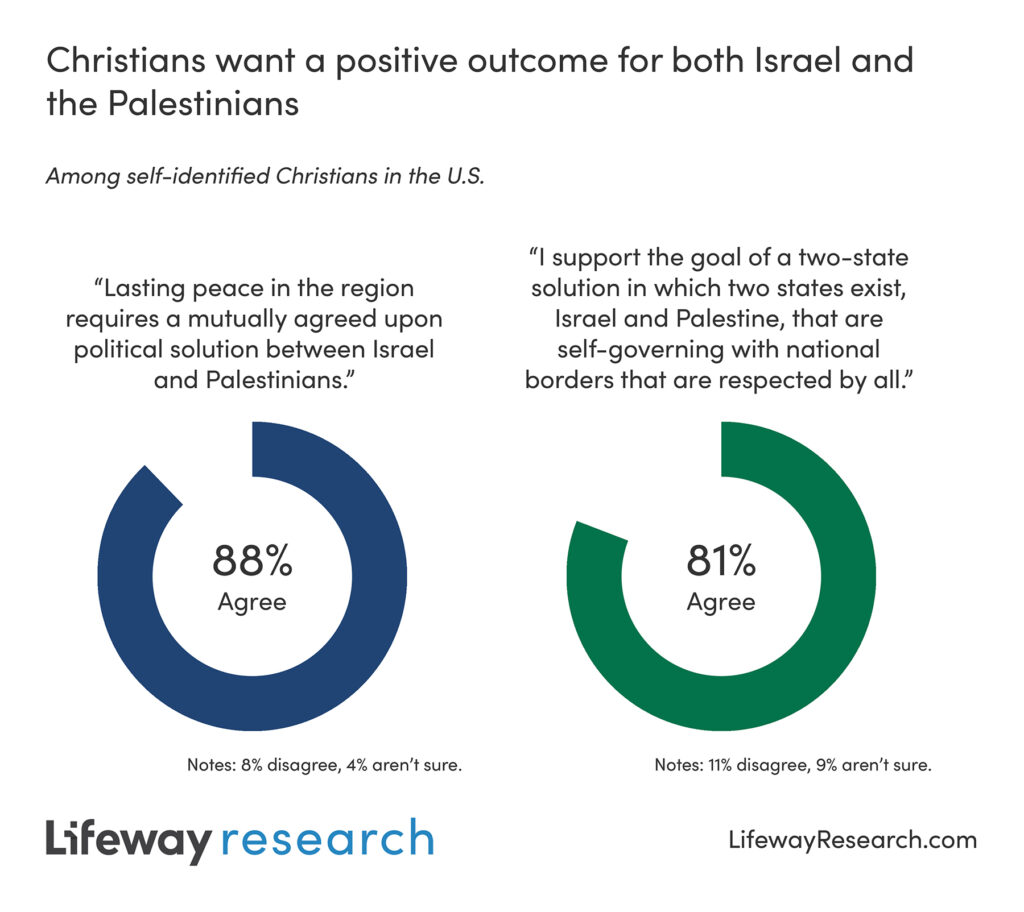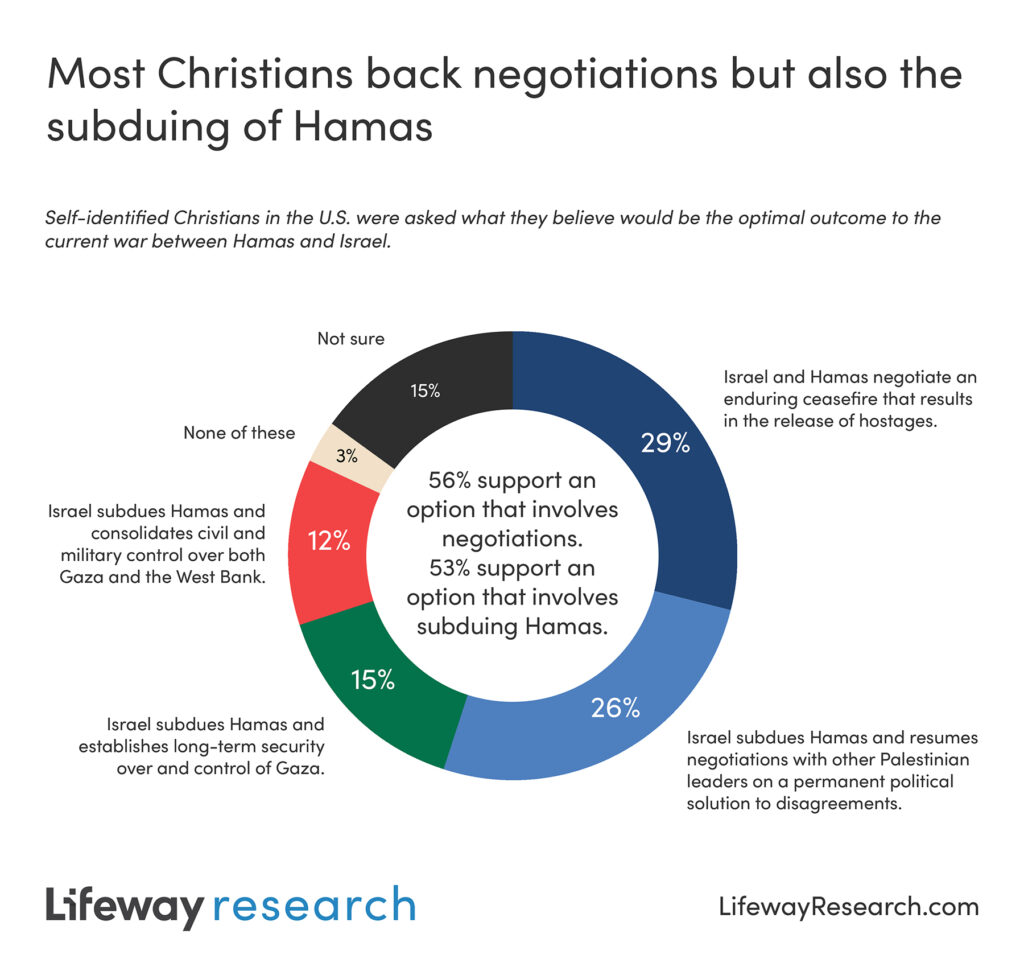On some of the underlying issues concerning the Palestinian people, U.S. Christians are more divided. They are split on whether Israeli control of Gaza and the West Bank is an illegal occupation (36% agree, 40% disagree). A plurality (45%) say Israeli settlements beyond the agreed-upon borders are illegal, but 24% disagree and 31% aren’t sure. While 43% disagree that the “armed rebellion of Palestinians against Israel” is a natural response to being mistreated by Israel, 39% agree.
U.S. Christians are more likely to believe Israel’s blockade of Gaza since 2005 has hurt Palestinian people more than Hamas. Half (50%) say the blockade has oppressed Palestinian people who have no option of leaving, while 26% disagree and 24% aren’t sure. A third (33%) believe the blockade has prevented Hamas from obtaining weapons to use against Israel. More (43%) disagree, and 25% aren’t sure.
“The widespread agreement we see among American Christians on defending the human rights of Israelis and Palestinians is absent when we look at specific tactics taken in recent years to address disagreements,” said McConnell. “American Christians disagree with one another on disputes over land and how Israel has sought to minimize ongoing terrorism.”
Best result of the conflict
Most U.S. Christians believe Israel and Hamas view civilian casualties as justified in the conflict. Slightly more than half (52%) say Israel appears to consider civilian casualties justified in the pursuit of military goals. Even more (77%) say the same about Hamas. As a result, most Christians want to minimize civilian deaths, and many want to see a ceasefire in the region.
U.S. Christians are split between wanting their fellow believers to advocate for Israel to fight Hamas to achieve specific results and to advocate for a ceasefire. Most (53%) say Christians should champion strong measures to minimize civilian casualties. Around 2 in 5 (42%) believe Christians should support an immediate, complete ceasefire to stop the killing. Other options find less support: 39% want freedom from oppression for innocent Palestinians, 38% back Israel fighting until all hostages are released, 33% support Israel fighting until Hamas surrenders and 30% believe Christians should advocate for the formation of a self-governing Palestinian state outside of Israel. One in 5 (21%) believe Christians should support “justice for all Hamas fighters who participated in the October 7, 2023, massacre.” Fewer say none of these (2%) or that they’re not sure (7%).
“When asked to respond to the war from a Christian perspective, most American Christians advocate for preserving lives including civilians, those fighting and hostages,” said McConnell. “This desire to preserve life coexists with a desire among the majority of American Christians for Israel to seek justice and save future lives by subduing Hamas.”
When asked what the optimal outcome for the conflict would be, most Christians prefer some type of negotiations (56%) and a majority prefer an option that begins with Israel subduing Hamas (53%). Almost 3 in 10 (29%) believe it would be best for Israel and Hamas to negotiate an enduring ceasefire that results in the release of hostages. Around a quarter (26%) prefer for Israel to subdue Hamas and resume negotiations with other Palestinian leaders on a permanent political solution to disagreements. Two smaller groups also want Israel to subdue Hamas and either establish long-term security over and control of Gaza (15%) or consolidate civil and military control over both Gaza and the West Bank (12%). Another 15% aren’t sure, and 3% say none of these.
Specifically, 88% of U.S. Christians believe lasting peace in the region requires a mutually agreed-upon political solution between Israel and Palestinians, while 8% disagree. Additionally, 81% support the goal of a two-state solution in which Israel and Palestine are self-governing with national borders respected by all, with 11% disagreeing.
U.S. Christians doubt Israel can only achieve a good result through military force. Two in 5 (41%) say the nation can secure a positive, long-term outcome solely through military force, but 47% disagree. American Christians are even more skeptical of the Palestinians’ need for fighting, as 16% say they can achieve their national aspirations solely through violence. More than 3 in 4 (77%) disagree.

Most say their church has made some type of response to the war. Almost half (45%) say their congregation has prayed for the peace of Israel and/or Jerusalem. Fewer say within their church they’ve seen condemnation of the killing of innocent civilians (18%), condemnation of Hamas’ attack on October 7 (15%), support voiced from church leadership for Israel (14%), appeals from church leadership to stand by Israel’s side during this war (10%), support voiced from church leadership for Palestinian Christians (9%) or appeals from church leadership to stand against the oppression of Palestinians (7%). For 18% of U.S. Christians, none of these have happened at their churches, and 25% aren’t sure.


